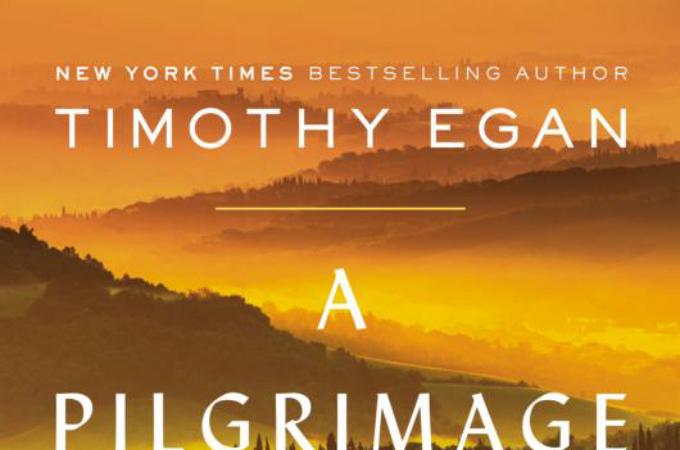Former Catholic's Canterbury-Rome 'pilgrimage' not exactly as billed
"A Pilgrimage to Eternity: From Canterbury to Rome in Search of a Faith" by Timothy Egan. Viking (New York, 2019). 367 pp., $28.
Timothy Egan, author of "A Pilgrimage to Eternity," writes a biweekly opinion column for The New York Times. He is a Pulitzer Prize-winning reporter and the winner of a National Book Award for nonfiction. He also grew up in a large Catholic family in the Pacific Northwest where he graduated from a Jesuit high school.
Egan and his Jewish wife raised their children with the intention of leaving them free to make their own choices vis-a-vis religion. To his credit, he admits that this may not have been the smartest move he and his spouse ever made. While he remains by choice at quite a distance from Catholicism he continues to be attracted to certain elements of the church's life and theology.
Egan decided to make a pilgrimage, not so much for spiritual reasons as to see where it might lead him both in an interior sense and geographically.
Instead of following the virtual stampede that takes place countless times each year along the Camino de Santiago in Spain, Egan chose a traditional pilgrimage from Canterbury, in England, to Rome. It's called the Via Francigena (pronounced "frahn-chee-jeh-na"), and this is the book he wrote about the experience itself and the thoughts and issues it raised for him.
It is, by turns, a travelogue and a reflection on what the author does today with his personal Catholic history, the Catholicism he can't totally ignore, and the ways he chooses to respond to all this.
In a not-brief section of his book, Egan confronts the clergy sex abuse scandal of recent decades, particularly in light of the fact that a young priest-abuser was assistant pastor of his own family's parish during some of his adolescent years.
He makes it clear that this has more than a little to do with his own rejection of the church, thus revealing his identification of Catholicism and the church with the priests and bishops responsible for the abuse scandal.
While understandable, it's unfortunate that Egan seems unable to make any distinctions between guilty priests and bishops and the vast faith community that is the church; the sacraments and liturgy that remain the same; the Scriptures that remain the same; the countless saints and near-saints who over more than two millennia, in tragic and frustrating circumstances, chose for rather than against the church; the sacred tradition that remains the same; and the forgiveness constantly given and received in the church that remains forever the same.
Instead, Egan clings to the bitterness he feels toward the Catholic Church as justification for keeping his distance; indeed, he seems to say that this is the only intellectually and morally honest position possible -- for him, at least. One wonders how Egan would respond to the late Father Andrew Greeley, who said: "If you can find a perfect church go and join it, but as soon as you do it won't be perfect anymore."
Egan is impressed with, even a fan of, Pope Francis. Prior to and in the course of his pilgrimage he does all he can to finagle a private audience with the Holy Father, all to no avail. Egan wants to ask the pope a few questions but in the end he gets no satisfaction.
He wanders about Rome some, visiting and scoffing here and there. Yet while viewing the incorrupt body of St. Lucy he swears that the saint's eyes open wider while he observes her face, and he snaps photos repeatedly. He visits the final dwelling place of St. Ignatius of Loyola, founder of the Jesuits, where he is astonished at the saint's 16th-century shoes, flattened and falling apart.
In the end, "A Pilgrimage to Eternity" isn't that at all. It's a journal of Egan's wanderings from England to Rome with occasional forays into his largely unimpressive theological opinions. Still, it's a book worth reading if for nothing else than exposure to the mind of one who represents many like himself, folks who identify as "ex-Catholic" but who can't seem to give up arguing about it.
- - -
Finley is the author of more than 30 books of popular Catholic theology, including "It's Not the Same Without You: Coming Home to the Catholic Church" (Wipf & Stock) and "What Faith is Not" (Sheed & Ward).



















